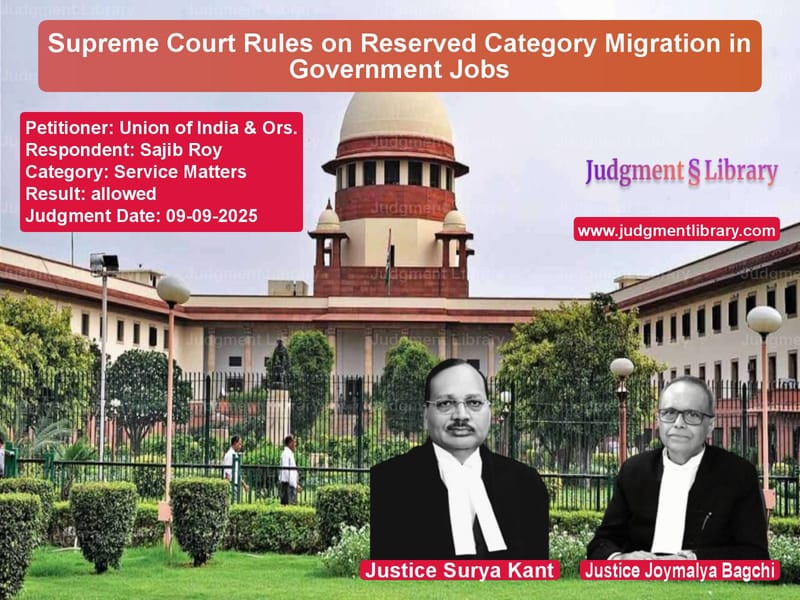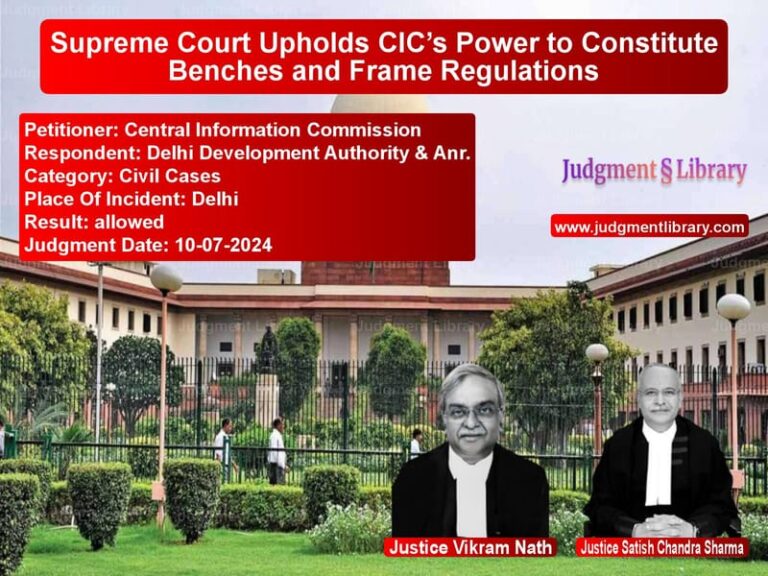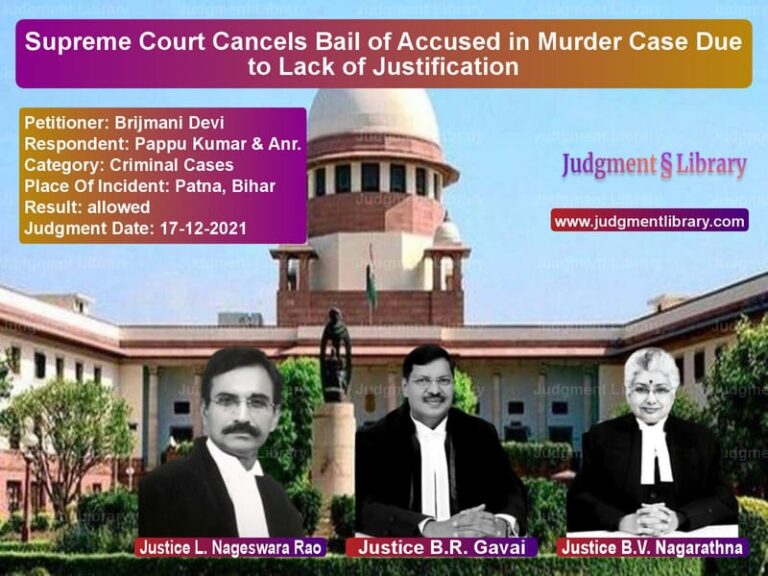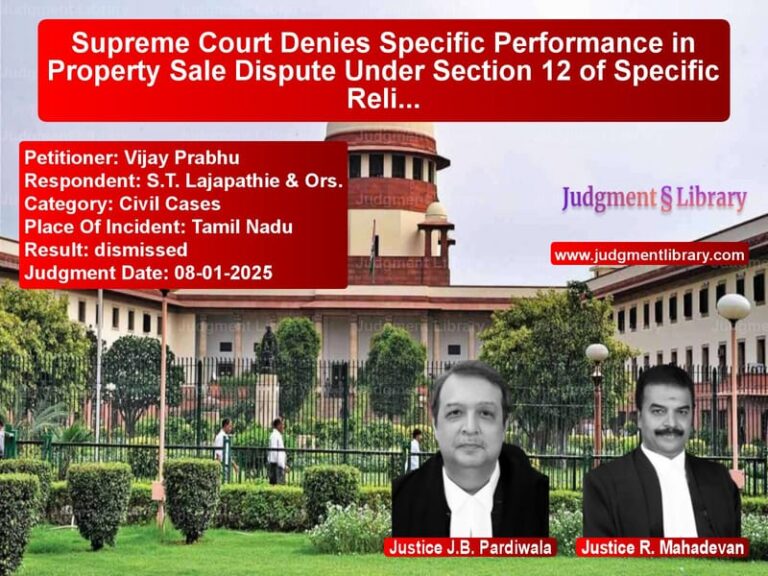Supreme Court Rules on Reserved Category Migration in Government Jobs
In a significant judgment that clarifies the complex interplay between reservation policies and merit-based recruitment, the Supreme Court of India has delivered a crucial verdict regarding the rights of reserved category candidates to migrate to unreserved seats in government jobs. The case, decided on September 9, 2025, involved multiple appeals concerning the recruitment of Constables (GD) in various paramilitary forces and brought to the forefront important questions about equality, reservation policies, and the interpretation of government regulations.
The dispute originated from a recruitment notification published by the Staff Selection Commission for the position of Constables (GD) in BSF, CRPF, ITBP, SSB, NIA, SSF and Rifleman in Assam Rifles. The employment notification prescribed an age limit of 18 to 23 years as on August 1, 2015, with age relaxation of three years provided for Other Backward Classes (OBC) candidates. Several OBC candidates, including the respondent Sajib Roy, availed this age relaxation to participate in the recruitment process. While they scored marks higher than the last selected candidate in the unreserved category, they could not secure positions in the OBC category as their scores were lower than the last selected OBC candidate. This led them to approach the courts, seeking permission to be considered for appointment under the unreserved category based on their merit.
The High Court, relying on the Supreme Court’s earlier judgment in Jitendra Kumar Singh & Anr v. State of UP & Ors, directed that these candidates should be considered for recruitment under the unreserved category. The High Court held that refusal to permit such migration would be counter to the principles of merit-based recruitment and opposed to the equality principles enshrined under Article 14 of the Constitution. The Union of India challenged this decision before the Supreme Court, bringing into focus an office memorandum dated July 1, 1998, which specifically barred such migration for candidates who had availed relaxations.
The Legal Battle and Arguments
The central issue before the Supreme Court was whether the High Court had erred in applying the ratio from Jitendra Kumar Singh’s case in light of the office memorandum dated July 1, 1998, which explicitly restricted the migration of reserved candidates who had availed concessions like age relaxation. The appellants, Union of India, argued that the respondents-writ petitioners had applied in the OBC category after availing age relaxation and under such circumstances could not be considered eligible for appointment in the unreserved category.
The respondents-writ petitioners, on the other hand, relied on several judgments including Vikas Sankhala & Ors v. Vikas Kumar Agarwal & Ors, Saurav Yadav & Ors v. State of UP & Ors, and others to sustain the view of the High Court that migration of reserved candidates who scored higher than the last selected unreserved candidate should be permitted. They argued that a bar to migration would violate the principles of equality under Article 14 and be counter to maintaining efficiency of administration enshrined under Article 335 of the Constitution.
The Supreme Court’s Analysis
The Supreme Court bench comprising Justices Surya Kant and Joymalya Bagchi conducted a thorough analysis of the legal framework and previous judgments on the subject. The court began by examining the Jitendra Kumar Singh case, which the High Court had relied upon. The Supreme Court noted that while Jitendra Kumar Singh contained general observations about reservations and concessions, the decision was fundamentally based on the interpretation of specific statutes and government instructions applicable in that case.
The court observed: “It is clear that the decision in Jitendra Kumar (supra) is not founded on the general principles but on the interpretation of the relevant statute, government order and instructions regulating the selection process.” The Bench further noted that in Jitendra Kumar Singh, government instructions dated March 25, 1994, expressly permitted reserved candidates availing concessions to be adjusted against unreserved seats.
However, the present case was governed by a different legal framework—the office memorandum dated July 1, 1998, which clearly stated: “when a relaxed standard is applied in selecting an SC/ST/OBC candidate for example in the age limit, experience qualification, permitted number of chances in written examination, extended zone of consideration larger than what is provided for general category candidates etc. the SC/ST/OBC candidates are to be counted against reserved vacancies. Such candidates would be deemed as unavailable for consideration against unreserved vacancies.”
The Supreme Court emphasized the importance of reading judgments in their proper context, quoting from Quinn v. Leathem: “every judgment must be read as applicable to the particular facts proved, or assumed to be proved, since the generality of the expressions which may be found there are not intended to be expositions of the whole law, but governed and qualified by the particular facts of the case in which such expressions are to be found.”
The court also referenced Haryana Financial Corporation & Anr v. Jagdamba Oil Mills & Anr, where it was held: “Circumstantial flexibility, one additional or different fact may make a world of difference between conclusions in two cases. Disposal of cases by blindly placing reliance on a decision is not proper.”
The Supreme Court then examined several subsequent judgments that had considered similar issues. In Deepa E. V. v. Union of India & Ors, a two-judge bench had already held that the ratio in Jitendra Kumar Singh was inapplicable to recruitment processes where migration is not permitted. The court in that case observed: “In the light of the express bar provided under the proceedings dated 1-7-1998 the principle laid down in Jitendra Kumar Singh cannot be applied to the case in hand.”
Similar views were expressed in Gaurau Pradhan & Ors v. State of Rajasthan & Ors, where the court held: “We are of the view that the judgment of this Court in Jitendra Kumar Singh which was based on statutory scheme and the Circular dated 25-3-1994 has to be confined to scheme which was under consideration, statutory scheme and intention of the State Government as indicated from the said scheme cannot be extended to a State where the State circulars are to the contrary.”
The Supreme Court also distinguished the cases relied upon by the respondents. In Vikas Sankhala, the concession involved lowering of qualifying marks in Teacher Eligibility Test, which did not provide any advantage in the final selection process. In Saurav Yadav, the court was dealing with horizontal reservation for women, and there was no rule prohibiting migration. The court noted: “However, such observations were premised on the fact that there was no rule, or direction which prohibited the adjustment of socially reserved categories of women in the general category or open category.”
The Final Ruling and Legal Principles
After analyzing all relevant cases and legal provisions, the Supreme Court summarized the legal position: “Whether a reserved candidate who has availed relaxation in fees/upper age limit to participate in open competition with general candidates may be recruited against unreserved seats would depend on the facts of each case. That is to say, in the event there is no embargo in the recruitment rules/employment notification, such reserved candidates who have scored higher than the last selected unreserved candidate shall be entitled to migrate and be recruited against unreserved seats. However, if an embargo is imposed under relevant recruitment rules, such reserved candidates shall not be permitted to migrate to general category seats.”
Applying this principle to the present case, the court held: “Accordingly, we hold as the respondents-writ petitioners had availed concession of age for participating in the recruitment process, in the teeth of office memorandum dated 01.07.1998, the High Court was wrong in applying the ratio in Jitendra Kumar (supra) and permitting them to be considered for appointment in the unreserved category.”
The Supreme Court therefore set aside the High Court’s judgment and allowed the appeals filed by the Union of India. This judgment establishes an important precedent that the specific rules governing each recruitment process must be examined carefully, and general principles from other cases cannot be mechanically applied without considering the specific legal framework applicable to the case at hand. The ruling emphasizes that while merit and equality are important constitutional values, they must be balanced against the specific regulatory framework established for recruitment processes, particularly when candidates have availed specific concessions meant for reserved categories.
Petitioner Name: Union of India & Ors..Respondent Name: Sajib Roy.Judgment By: Justice Surya Kant, Justice Joymalya Bagchi.Judgment Date: 09-09-2025.Result: allowed.
Don’t miss out on the full details! Download the complete judgment in PDF format below and gain valuable insights instantly!
Download Judgment: union-of-india-&-ors-vs-sajib-roy-supreme-court-of-india-judgment-dated-09-09-2025.pdf
Directly Download Judgment: Directly download this Judgment
See all petitions in Recruitment Policies
See all petitions in Judgment by Surya Kant
See all petitions in Judgment by Joymalya Bagchi
See all petitions in allowed
See all petitions in supreme court of India judgments September 2025
See all petitions in 2025 judgments
See all posts in Service Matters Category
See all allowed petitions in Service Matters Category
See all Dismissed petitions in Service Matters Category
See all partially allowed petitions in Service Matters Category







